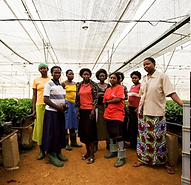
Projects
Some of our past and present projects:
Click on the titles to find out more...
"Beauty Without the Beast"
Across Kenya, the hair and beauty industry offers creativity, community, and income for millions of workers — most of them young women. Yet behind the vibrant styles and entrepreneurial spirit lies an unspoken reality: many work without contracts, social protections, or the financial independence to leave unsafe jobs or to challenge gender-based violence and harassment (GBVH).
Women Working Worldwide (WWW), in partnership with the Kenya Union of Hair and Beauty Workers (KUHABWO) and the Kenya Financial Education Centre (KFEC), ran Beauty Without the Beast — a pioneering pilot project tackling financial illiteracy as a root cause of GBVH. .
"Consent. Just Consent. Then you can come to work"
A groundbreaking report, shining a light on the underlying causes and multiple perilous risk factors associated with gender-based violence and harassment (GBVH) for the women producing the tea that we all enjoy.
THIRST and Women Working Worldwide, alongside tea sustainability expert Michael Pennant-Jones, have pinpointed how GBVH enablers manifest specifically within the tea sector.
Building Resilience in Kenyan Flower Supply Chains
This 2020-21 COVID-19 project is a partnership, led by Fairtrade Foundation and MM Flowers, with participation from WWW, Coventry University, FNET, Partner Africa, &Wider and co funded by retailers Co-Op, M&S and Tesco. Funded by Foreign, Commonwealth Development Office (FCDO) as part of their Business Partnerships for Global Goals (BP4GG) and Vulnerable Supply Chain Facility (VSCF).
Safe Spaces
This report for ETI is a call for all sectors to work together to champion gender equality, support women to access the right to freedom of association and improve women workers’ rights through the effective recognition of the right to collective bargaining.
Conflict Minerals
This report examines the complex ethical issues of mining and how they can be navigated in order to minimise human rights abuses in the sector in the DRC, without cutting off a vital supply of income for many people.
Aurat (women's) March
This report gives an overview of the Aurat March (AM) that has been taking place in Pakistan annually for the past three years. AM was first organised in 2018 to bring attention to the increasing amount of violence and harassment that takes place against women. Its aim is to give women a voice that has often been brutally silenced.
Gender Equality
Funded by the Ethical Trading Initiative (ETI) this was a partnership project developed by WWW and Banana Link to detail case studies from the Flowers, Tea and Banana industries. Its aim was to share good practice and highlight positive examples of gender equality activities.
The second phase widened to incorporate the NGO Homeworkers Worldwide and provide examples from women in the garment industry supply chains who work from home.
Developing Strategies For Change For Women Workers in African Horticulture
This project, which ran from 2009 to 2011, aimed to improve the working conditions of women workers on horticultural farms in Ethiopia, Uganda and Tanzania.
Promoting Women Workers’ Rights in African Horticulture
This was a three-year study (2005-2008) investigating the situation of women workers in the African horticulture sector.



